Fiercely We Will Battle
January Book #2 Update
Ed Oxford and I went to Yale University in September 2017 to check an assumption I had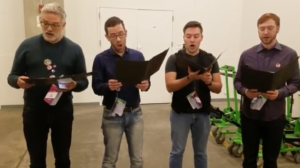 made about the word "homosexual" being placed in the Revised Standard Version (RSV) (1946)—the first usage of "homosexual" in any Bible translation, in any language. (Read the story here.)
made about the word "homosexual" being placed in the Revised Standard Version (RSV) (1946)—the first usage of "homosexual" in any Bible translation, in any language. (Read the story here.)
While searching through the archives, we found the evidence we were hoping to find in the form of an important correspondence exchange addressing the placement of the word "homosexual" in the RSV.
We spent about an emotional half hour reading slowly through a series of letters between Dr. Luther Weigle (the head of the translation team of the RSV) and a young seminarian who questioned the RSV's usage of "homosexual" in place of two Greek words, malakos and arsenokoitai. (And, yes, we documented it on video as well!)
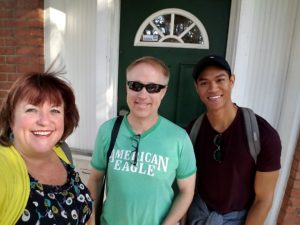
Kathy, Ed and Peter, who came along to document the search
It was clear that the young seminarian understood not only the meaning of the words malakos and arsenokoitai, but a great deal about homosexuality as well.
The exchange was respectful and, though the seminarian presented an excellent case of why "homosexual" was the wrong word, Weigle and the team stuck with it in subsequent editions and revisions. (In the 1971 revision, another team used "sexual pervert" in lieu of "homosexual," but by then, in the culture, "homosexual" and "sexual pervert" had become synonymous.)
We could easily see that Weigle and his team had little understanding of human sexuality, which was typical of any lay person from the 1930s through the 1960s. This was clearly evidenced in nuance of language and assumptions in the exchange and in other findings and references we came across during our search. The team's translation usage of "homosexual" was indeed more rooted in cultural and ideological biases than in accurate theological work.
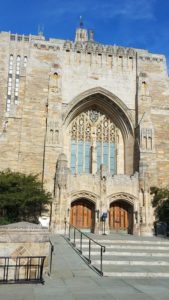 Ed said, "Kathy, take a break. We found it. You proved you were right, we did it!" I was emotionally drained, I just wanted to sit there. I was in agony.
Ed said, "Kathy, take a break. We found it. You proved you were right, we did it!" I was emotionally drained, I just wanted to sit there. I was in agony.
Ed wanted to escape the microfilm dungeon for a bit and headed up to the library atrium. A chorus was singing in the beautiful vaulted space. Ed backtracked and insisted I take a break and join him. I went reluctantly.
After listening to a few selections I thought, I should record this, it's beautiful.
The chorus was singing (I found out months later) "Vyotsa." As I listened, I was completely awash in deep, deep sorrow. I stopped recording and began to sob. Ed looked at me, "Kathy, why are you crying? You found it, the needle in the haystack, you found it!"
Though I had no idea what the words I was hearing were, the song made me feel so profoundly sad.
I began to sob while rambling to Ed. I was talking about all the loss, all the pain, all the damage unintentionally done, and what subsequent translators had done with the initial mistake. I kept asking, "How do we fix this, how do we make this right?"
When we ended our teaching time at recent Gay Christian Network/Q Christian Fellowship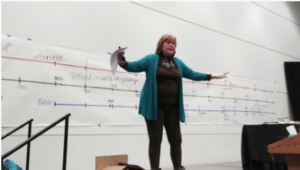 conference in Denver last week, Ed and I wanted people to understand what we had found through our initial research. The malicious attitudes we thought we would find were not there. The usage of "homosexual" in the RSV was an uninformed error, a huge one; but still, it was done without malice, and in ignorance. People, including the RSV translation team, just did not understand sexuality in the 1930s and 1940s.
conference in Denver last week, Ed and I wanted people to understand what we had found through our initial research. The malicious attitudes we thought we would find were not there. The usage of "homosexual" in the RSV was an uninformed error, a huge one; but still, it was done without malice, and in ignorance. People, including the RSV translation team, just did not understand sexuality in the 1930s and 1940s.
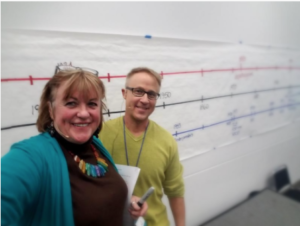 Ed and I wanted to invite workshop attendees into the sorrow and hopefully, the desire to reclaim the truth and to correct wrongly translated words that had been used against them.
Ed and I wanted to invite workshop attendees into the sorrow and hopefully, the desire to reclaim the truth and to correct wrongly translated words that had been used against them.
Vyotsa
(1957, a Cossack tribute to fallen soldiers)
The gray smoke rises
You are my village
We will not surrender you,
Fiercely we will battle!
[This video is from the practice run in the hall behind the presentation room. The acoustics are wonderful!]
Ed and I discuss the presentation at GCN/QCF:
